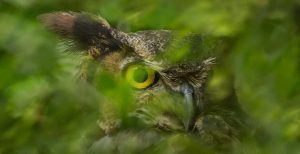 The Yogabliss, Two Rivers/River Tree Yoga on-line Moving into Meditation classes met this morning. Thank you for coming to practice today. It’s so easy to get swept away by the dramatic events unfolding in our world. The pull of events doesn’t stop – and we can easily exhaust ourselves trying to cope with one fear after the next. We are creaturely beings and our instincts are humming under the noise – our instincts toward wellness brings us to stillness.
The Yogabliss, Two Rivers/River Tree Yoga on-line Moving into Meditation classes met this morning. Thank you for coming to practice today. It’s so easy to get swept away by the dramatic events unfolding in our world. The pull of events doesn’t stop – and we can easily exhaust ourselves trying to cope with one fear after the next. We are creaturely beings and our instincts are humming under the noise – our instincts toward wellness brings us to stillness.
We explored our animal nature through our senses – especially the sense of touch. Hands can be a place to anchor and ground your awareness at any time. You can hold your own hand in the midst of life’s turbulence. In his book, My Grandmother’s Hands, author and trauma therapist, Resmaa Menakem describes the importance of having a settled body in our relations.
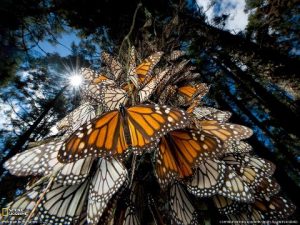 We drew on the work of David Abram, Director of the Alliance for Wild Ethics. David is a cultural ecologist and geo-philosopher whose books include Becoming Animal: An Earthly Cosmology and The Spell of the Sensuous: Perception and Language in a More-than-Human World. His point of view inspired our exploration of the ways our animal nature and sensory perception exist in a “field of relationship” between the human body and the breathing earth. If you want to explore David’s work I highly recommend this audio essay, Creaturely Migrations on a Breathing Planet. It’s is an awe inspiring account of the magical migrations of salmon, sandhill cranes and monarch butterflies that takes you deep into mystery.
We drew on the work of David Abram, Director of the Alliance for Wild Ethics. David is a cultural ecologist and geo-philosopher whose books include Becoming Animal: An Earthly Cosmology and The Spell of the Sensuous: Perception and Language in a More-than-Human World. His point of view inspired our exploration of the ways our animal nature and sensory perception exist in a “field of relationship” between the human body and the breathing earth. If you want to explore David’s work I highly recommend this audio essay, Creaturely Migrations on a Breathing Planet. It’s is an awe inspiring account of the magical migrations of salmon, sandhill cranes and monarch butterflies that takes you deep into mystery.
Finally poet Mary Oliver gifted us her very human, down to earth poem, Begin With, The Sweetgrass.
Relaxed Reflection
Let your body settle . . . your breathing relax . . . and your heart rest . . . Really take in the pleasure of feeling and moving . . . savoring the experience as your body begins to shift into stillness . . .
In his book, My Grandmother’s Hands, trauma therapist and social justice activist, Resmaa Menakem, counsels that:
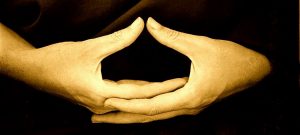 Few skills are more essential than the ability to settle your own body. If you can setttle your body, you are more likely to be calm and fully alert no matter what is going on around you. A settled body enables you to harmonize and connect with other bodies around you, while encouraging their bodies to settle as well.
Few skills are more essential than the ability to settle your own body. If you can setttle your body, you are more likely to be calm and fully alert no matter what is going on around you. A settled body enables you to harmonize and connect with other bodies around you, while encouraging their bodies to settle as well.
We are animal beings . . . creatures living among creatures . . . We sense each other and we resonate with one another. Below the surface of our skin . . . in our empty hands . . . behind our face and in our shining eyes . . . we share the same needs. . . air, food and water . . . movement and rest . . . nourishing touch . . . safety and trust . . . autonomy and connection . . . acceptance and belonging . . . meaning and understanding . . . These needs move us and sustain us . . .
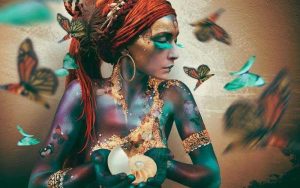 They can bring us together with human beings and with more than human beings in our biosphere. Right now we can remember times in our lives when we could sense – instinctively, intuitively – another’s needs. We read another being with our eyes and ears . . . with our arms and hands . . . with our minds and hearts . . . You might recall the last time you had this experience – perhaps with a baby, a family member, a friend, a pet . . . You might have held them in your arms or listened to them wholeheartedly . . . Bring the experience back as vividly as you can. . . How did it feel in your body – your heart – your mind?
They can bring us together with human beings and with more than human beings in our biosphere. Right now we can remember times in our lives when we could sense – instinctively, intuitively – another’s needs. We read another being with our eyes and ears . . . with our arms and hands . . . with our minds and hearts . . . You might recall the last time you had this experience – perhaps with a baby, a family member, a friend, a pet . . . You might have held them in your arms or listened to them wholeheartedly . . . Bring the experience back as vividly as you can. . . How did it feel in your body – your heart – your mind?
Sometimes it is difficult to feel deep caring and uncertainty – not knowing what to do – other than to offer your presence – your calm and settled body – your steady heart beat and calm breathing.
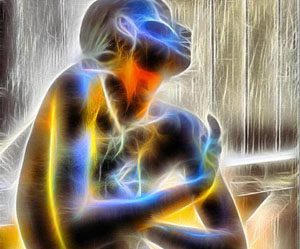 Being willing to truly feel – first one’s self and then another – calls for a kind of courage . . . the same courage we bring to life when we can be present for what is true – not trying to out pace what is real in the many escapes we have in modern life. Our willingness to see and hear another creature – so different from us – and seeing and hearing this being without fear or bias or projection. . . this is to have an encounter with magic and mystery.
Being willing to truly feel – first one’s self and then another – calls for a kind of courage . . . the same courage we bring to life when we can be present for what is true – not trying to out pace what is real in the many escapes we have in modern life. Our willingness to see and hear another creature – so different from us – and seeing and hearing this being without fear or bias or projection. . . this is to have an encounter with magic and mystery.
Cultural ecologist, geophilosopher and writer, David Abram says that
. . . [We] are tuned for relationship. The eyes, the skin, the tongue, ears, and nostrils—all are gates where our body receives the nourishment of otherness.
He reminds us that we are in
a living field of relationships between beings – each being with its own openness or creativity . . .
David says that
. . . when we are at ease in our animal flesh, we will sometimes feel we are being listened to, or sensed, by the earthly surroundings. . . .
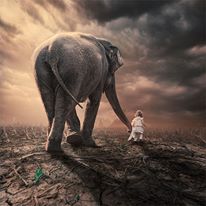 Right now we can reflect on how we bring our animal selves to other more than human beings . . . how we open our senses to receive the nourishment of otherness . . . Recalling the last time you entered that living field of relationships. Perhaps you glimpsed a wild animal . . . a majestic old growth tree . . . a spouting whale . . . the last bird call welcoming the morning . . . the soft velvet of a horse’s muzzle . . . the amazing textures of a sunflower’s face . . . Can you remember – can you re-embody – that experience?
Right now we can reflect on how we bring our animal selves to other more than human beings . . . how we open our senses to receive the nourishment of otherness . . . Recalling the last time you entered that living field of relationships. Perhaps you glimpsed a wild animal . . . a majestic old growth tree . . . a spouting whale . . . the last bird call welcoming the morning . . . the soft velvet of a horse’s muzzle . . . the amazing textures of a sunflower’s face . . . Can you remember – can you re-embody – that experience?
These encounters are also part of the deeper needs we share. We hunger for the awakening we experience in meeting and wonder. Mary Oliver describes meeting the world in her poem, Begin With, The Sweet Grass
What I loved in the beginning, I think, was mostly myself.Never mind that I had to, since somebody had to.
That was many years ago.
Since then I have gone out from my confinements,
though with difficulty.
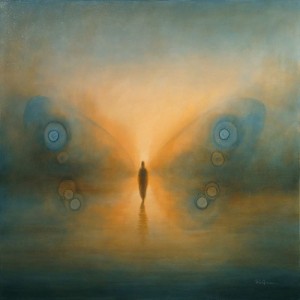 I mean the ones that thought to rule my heart.
I mean the ones that thought to rule my heart.
I cast them out, I put them on the mush pile.
They will be nourishment somehow (everything is nourishment
somehow or another).
And I have become the child of the clouds, and of hope.
I have become the friend of the enemy, whoever that is.
I have become older and, cherishing what I have learned,
I have become younger.
And what do I risk to tell you this, which is all I know?
Love yourself. Then forget it. Then, love the world.
Love yourself, then forget it, then love the world.
